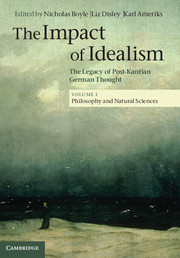Book contents
- Frontmatter
- Contents
- List of Illustrations
- List of Contributors
- Acknowledgements
- List of Abbreviations
- Foreword
- General introduction: the eighteenth and nineteenth centuries
- General introduction: the twentieth and twenty-first centuries
- Introduction: Idealism in the natural sciences and philosophy
- 1 Philosophy of natural science in Idealism and neo-Kantianism
- 2 The impact of German Idealism and Romanticism on biology in the nineteenth century
- 3 The unconscious: transcendental origins, Idealist metaphysics and psychoanalytic metapsychology
- 4 Nietzsche, Kant and teleology
- 5 Transcendental idealism, phenomenology and the metaphysics of intentionality
- 6 Heidegger and the impact of idealism
- 7 French Hegelianism and anti-Hegelianism in the 1960s: Hyppolite, Foucault and Deleuze
- 8 Scottish Idealism
- 9 ‘My station and its duties’: social-role accounts of obligation in Green and Bradley
- 10 Idealism and the origins of analytic philosophy1
- 11 Idealism and Pragmatism: the inheritance of Hegel's concept of experience
- 12 Reason's form
- Bibliography
- Index
- References
8 - Scottish Idealism
Published online by Cambridge University Press: 05 December 2013
- Frontmatter
- Contents
- List of Illustrations
- List of Contributors
- Acknowledgements
- List of Abbreviations
- Foreword
- General introduction: the eighteenth and nineteenth centuries
- General introduction: the twentieth and twenty-first centuries
- Introduction: Idealism in the natural sciences and philosophy
- 1 Philosophy of natural science in Idealism and neo-Kantianism
- 2 The impact of German Idealism and Romanticism on biology in the nineteenth century
- 3 The unconscious: transcendental origins, Idealist metaphysics and psychoanalytic metapsychology
- 4 Nietzsche, Kant and teleology
- 5 Transcendental idealism, phenomenology and the metaphysics of intentionality
- 6 Heidegger and the impact of idealism
- 7 French Hegelianism and anti-Hegelianism in the 1960s: Hyppolite, Foucault and Deleuze
- 8 Scottish Idealism
- 9 ‘My station and its duties’: social-role accounts of obligation in Green and Bradley
- 10 Idealism and the origins of analytic philosophy1
- 11 Idealism and Pragmatism: the inheritance of Hegel's concept of experience
- 12 Reason's form
- Bibliography
- Index
- References
Summary
Although the English triumvirate of Green, Bosanquet and Bradley are often taken to be the leading exponents of British Idealism, a surprisingly long list of Scottish thinkers also made important contributions to the development and transmission of Idealist philosophy. In terms of their numbers, range of intellectual topics, influence throughout the wider English-speaking world, religious and political allegiances, and impact upon subsequent generations of philosophers, the Scottish Idealists deserve greater attention than is sometimes accorded in studies of the British movement. As Tom Devine notes, this neglect has been compounded by excessive scholarly concentration upon the philosophy of the Scottish Enlightenment a century earlier. Nevertheless, like their eighteenth-century predecessors, the Scottish Idealists also regarded themselves as part of a wider British and European culture. While their native provenance may have set them apart in important respects, they interacted with German and English scholars in multiple ways. There was, for example, already a long history of intellectual traffic between Glasgow and Oxford. Philosophers such as William Wallace (1843–1897) and Edward Caird (1835–1908) held prestigious positions at Merton and Balliol, and they would not have recognised their work as representing an exclusively Scottish school of thought. William Paton Kerr (1855–1923), a Glaswegian, held chairs in literature in South Wales, London and Oxford, where he was a fellow of All Souls for much of his life. W. R. Sorley (1855–1935), one of the few Idealist sympathisers in Cambridge, hailed from Selkirk in the Scottish borders. Since the Scots were so prominent within British Idealism, their distinctive contribution merits separate treatment.
The arrival of Hegel in Scotland
The extent to which British Idealism can be characterised as Hegelian is disputed. The arguments of Green and Bradley may have had affinities to German Idealism but these seemed to be advanced in relative independence from that tradition. In Scotland, however, the commitment to Hegel was generally stronger, especially in the writings of Edward Caird, John Caird and Henry Jones, all of whom taught in Glasgow. Most Scottish philosophers and theologians studied in Germany from about 1860. Their facility in the German language was confirmed by the production of some of the key translations of Hegel's works. Although Scottish writers were at pains to stress their avoidance of any slavish adherence to Hegel, this was asserted from within a context of developing and extending his project rather than departing from it.
- Type
- Chapter
- Information
- The Impact of IdealismThe Legacy of Post-Kantian German Thought, pp. 272 - 298Publisher: Cambridge University PressPrint publication year: 2013
References
- 2
- Cited by

